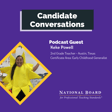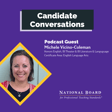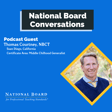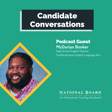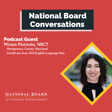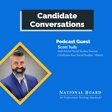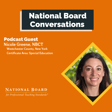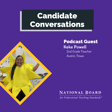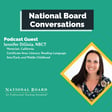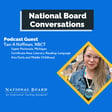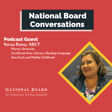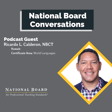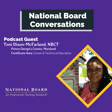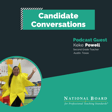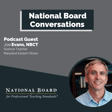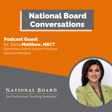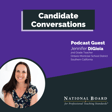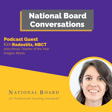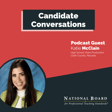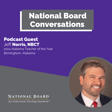Become a Creator today!Start creating today - Share your story with the world!
Start for free
00:00:00
00:00:01

Kimberly Jones, NBCT - 2023 North Carolina Teacher of the Year
Kimberly Jones, NBCT, is the 2023 North Carolina Teacher of the Year! She recently joined National Board Conversations to discuss her journey, and what keeps her in the classroom. She has a passion for culturally responsive teaching and does a full quarter teaching the holocaust in her classroom!
Don't miss out on all National Board related updates; follow us on social media to keep up!
Twitter: @NBPTS
Instagram: @NBPTS
Facebook: The National Board for Professional Teaching Standards
Transcript
Introduction and Campaign Overview
00:00:00
Speaker
What's up, everyone? Welcome back to National Board Conversations. In this episode, we kick off our IMN NBCT campaign, showcasing the diverse faces of NBCTs across the country. And at the end of this episode, I will give you instructions on how you can participate in the campaign.
Interview with Kimberly Jones Begins
00:00:15
Speaker
But in a minute, you'll have the chance to listen to my conversation with the brilliant Kimberly Jones. She is a national board certified teacher who believes deeply and culturally responsive lessons and was recently named the 2023 North Carolina Teacher of the Year. I can go on and on and on about her. She calls in from Chapel Hill, North Carolina. I won't keep you any longer. Here's my conversation with Kimberly Jones.
00:00:43
Speaker
Kimberly Jones, thank you for joining me. How are you doing today? Doing great. Thanks so much for having me, Eddie. Oh, yeah. No, this is something we're looking forward to. Something I've been looking forward to. My co-colleague, Stacey X, has said that people in North Carolina rave about you. So they've gotten me excited to talk to you. So we'll get started. Awesome. What is your current role and give a little bit of attention of yourself?
Kimberly's Career and Personal Insights
00:01:05
Speaker
Awesome. I am the
00:01:07
Speaker
2023 Boroughs Welcome Fund North Carolina Teacher of the Year. Currently, I'm in my 17th year teaching English with a focus on world literature at Chapel Hill High School. Here at Chapel Hill, I also serve as the co-coordinator for the AVID program and work in my district on lots of different instructional and equity-based
00:01:32
Speaker
leadership opportunities and Chapel Hill is in the Chapel Hill Carver City School Districts in North Carolina. Okay, we like it. So we're gonna get a little bit of know you a little bit on the personal side. So what are your three favorite foods? Hands down, pot roast, any kind of sweet potato, candied, baked, any kind of sweet potato, and probably spinach. I'll just make it a meal. So I'll go pot roast, cream, spinach, sweet potatoes. Like a healthy person.
00:02:02
Speaker
I mean, most likely those sweet potatoes are going to be candied, and that spinach is going to be creamed, and there's going to be lots of gravy on the pot roast. But thanks. I'll take that back to my doctor. I'm like, well, anything. I have a very healthy diet. Thank you very much.
00:02:22
Speaker
So I don't know if you've ever been to Dallas. There's this barbecue place called Pecan Lodge, right? And they have the sweet potato. It's like a loaded sweet potato with brisket and everything you get in a loaded potato. Listen, it is everything. So if you ever go to Dallas. Thank you. Like get you one of them. It is. All right. So what are three songs that define you? Um, I will go optimistic by sounds of blackness. Um,
00:02:50
Speaker
Smiling Face by James Taylor and Higher Love by Steve Wynwood, but the Whitney Houston cover. Oh, okay. Okay. I like it. I like it. I like a little versatility in there. Just a little bit, just a little bit. All right. And the one sports team that has your heart, and if you're not a sports person, who's your favorite movie TV or book character of Walter? Gonna go Alma Mater, Wake Forest, Demon Deacon. Oh, Wake Forest. Okay. All day.
00:03:19
Speaker
My friend, my friend who now works for the Sacramento Kings, used to do the social media and stuff for the Wake Forest sports teams for a few years.
00:03:28
Speaker
Look at that. Look at that black and gold everywhere. I love it. He still loves Wake Forest. He's still all about it, even though he went to school with me at West Virginia. Now, real talk, Wake Forest is so small. When you see somebody wearing a Wake Forest t-shirt, you're like, you had to go there. We don't just pick up fans at random, but once you're in the family,
00:03:51
Speaker
You bleed black and gold for life. Yeah. Like last year's college football team or a couple of years ago. Yes. Like every like they just showed out. Like everybody showed out. When I was in grad school we went to the Orange Bowl and it was you know how like the commentators talk during the game. I will never forget.
00:04:09
Speaker
They were either coming back from commercial or throwing it out of commercial, but they were like, tonight, there are this many Wake Forest fans. Odd fact, if you took every person who ever graduated from Wake Forest and you put them in this stadium, it will not fill the stadium. But we're here, though. That's it. That's it. But we made it. Exactly.
00:04:35
Speaker
I love it. Small and mighty.
Journey to Teaching and Certification
00:04:38
Speaker
Can you share why you became a teacher and why you remained in the classroom? Absolutely. I, according to my mom, have been teaching forever. I always loved learning. And by the time that I was in high school
00:04:52
Speaker
I knew that I was interested in teaching, but I also wanted to make money and I did not think that would happen in the classroom. So I guess I thought it gets my interest in my calling, but I went to the North Carolina governor's school program when I was a junior in high school and it took me out of my small town and it exposed me to a version of learning.
00:05:16
Speaker
and a curriculum that I hadn't had access to previously. I was in a really diverse learning community. Governor's school was when I met my first vegetarian.
00:05:28
Speaker
I met the first person who did not share my religious background. And I saw like the beauty in diverse perspectives. I had teachers from all kinds of walks of life. And I just feel like that was the first time that I saw the true power of educators, not only to help you grow your skills, but to like
00:05:52
Speaker
sharpen and hone your perspective on the world. And I wanted to be a part of that. So after that summer at Governor's school, I actually started looking into what would it look like to major in education? Where would I want to teach? And by the time I finished with my undergrad degree at Wake, I had decided, yeah, I want to be an educator. And so I got my graduate degree at Wake from the
00:06:18
Speaker
a Wake Forest Master Teaching Fellows Program, and I got the chance to study under incredible educational leaders and pedagogues, and it was the best choice I've ever made, hands down. And I think that's what keeps me there, the opportunity to be that for another person, for a teenager to show them a vision of the world, or maybe even a vision of themselves that they hadn't considered previously,
00:06:47
Speaker
and to watch their personal potential kind of unlock. That's what keeps me coming back. That's awesome. I love seeing those light bulb moments in people when they finally get something. Absolutely. Absolutely. So what puts you to pursue national board certification?
00:07:04
Speaker
Um, so do you want my like philosophical answer? Listen, give me all the answers. So a couple of things. Number one in North Carolina, I'm very fortunate to live in a state that values, um, the national board, uh, process and what it, what it leads teachers to think and do. Um, and they show that value through a statewide supplement. So as a beginning teacher, I think I did it the first year I was eligible.
00:07:33
Speaker
Um, because I had student loans to pay off, but I also, I also, at the time, our state provided tuition assistance to complete the program. And I was in a school full of highly qualified teachers, many of whom had already gotten their national boards and were constantly encouraging me to do it.
00:07:59
Speaker
When they saw that I was already invested in school change and in school leadership, when they saw that I was already taking part in some of the data dives and reflective pedagogy, they were like, Kim, you are doing the work. Do this process.
00:08:18
Speaker
Um, you know, be, be paid for it, be supported in doing it, and you will come out better and stronger and with this amazing qualification. And I'm so glad that I listened and that was at this point, um, gosh, 12 years ago, something like that. Oh man. So then.
00:08:41
Speaker
So you've been in the education for a little bit. But no, that's something we try to do to message to a lot of folks who get involved in the process. A lot of times you're already doing a lot of the work. Yes, absolutely. And it's just about documenting it now and making sure you get paid for it like you. That part. That part. If you're doing the work, be compensated for it. If you're doing the work. And it's also, for me, it helped me to see a lot of things
00:09:08
Speaker
that I was doing and wasn't necessarily categorizing correctly or necessarily giving myself credit for. But when I got into the boards process and I started doing some of the reflection work and the reflective work on my practice,
00:09:25
Speaker
It made me more thoughtful about the choices that I was making moving forward. That's awesome. So what was your journey like? Did you achieve on your first try? I did. I did. I was very, very fortunate again to have a team of, uh, of fellow teachers who were willing to read entries and give feedback and just general encouragement when you're feeling a little stressed out or it's feeling a little overwhelming.
00:09:51
Speaker
And the first time I did it was, I mean, it was old school. So I got the box, the labels and the homie. You wouldn't have thought I was handing over the Holy Grail. Me and the UPS man, we had a very long conversation about how important this box was. Like my whole life is in this box, homie. You don't understand, there is no try again. But yeah, so I was incredibly fortunate to have
00:10:21
Speaker
a lot of amazing colleagues. He supported me. And the cool thing was I was completing my boards, of course, in young adult English language arts, but I had my entries read over by science writers because I kept going over the limit. Like I, you know, I love acting and an adverb and my entries were so long Eddie. I was like, oh my God, I could never, there's no way, there's nothing I could cut. I would hand it to a science teacher.
00:10:47
Speaker
And this man would take a black Sharpie just like, yes, this is redundant. This is a, I'm like, no, you need that contact. No, you do not. And he was like, Kim, do you have too much? And I'm like, yes. He's like, then you got to cut something and he would carve through it with a knife and be like, this is the essential information. This you can reword blah, blah, blah, blah, blah. And I know there's no way, um, that I would have done it so early in my career, had I not had that incredible network of support.
00:11:17
Speaker
No, that's awesome. So like, it sounds like having that team was vital to your success. What was the most helpful coaching conversation or resource you received while you were going through the process? And it's going to sound really simple, but to answer the literal questions and the literal prompts that you are being provided with.
00:11:39
Speaker
that this is not a dissertation, your transitions. This doesn't have to be the epic story of you as a teacher. Answer the prompts that you are given, provide the documentation that they ask for and trust that you're doing the work. And that was super helpful for me because like I said, I loved an adjective and an adverb.
00:12:03
Speaker
you needed to paragraph the context before we got to the thing. And they were like, no, Kim, give them the thing. So that was probably the most helpful to just, you know, better tune myself to what was being asked in the different components and give the reviewer what they're asking for. So they got you and they got you right. They did. And now I'm in a position where I can offer that same help and feedback and
00:12:30
Speaker
and direction to other people, which is really cool. And it's why if anybody ever asks for support, I always offer it up. You know, even when my schedule is otherwise quite busy because people made that time for me. And it's really important for me to give back in that same way. So how did becoming an NBCT impact your career? I mean, it is within my school district, particularly it is a rite of passage of strong teachers.
00:13:01
Speaker
It became a leading fact that I shared about myself when I was introducing myself to parents, especially as a very young educator, it was really critical. I wanted my parents to know that their students were in good hands. And when you're 26 or 27 and the parents are 45 and 46,
00:13:26
Speaker
Age is not on your side. And now there is experience at that point, but showing yourself as an equipped, as a thoughtful, as a reflective teacher who has been vetted and credentialed by an organization like the National Board was a really big deal. And sort of on the personal side, I will say it also did make me
00:13:51
Speaker
thoughtful and more intentional about the professional development opportunities that I took, like knowing that I would eventually renew, knowing what the national boards expects, what they're wanting to see from teacher leaders. It led me to perhaps diversify my professional development a bit more than I would have on my own.
Innovative Teaching Methods and Social Issues
00:14:12
Speaker
Okay, so you take initiative to have more culturally responsive lessons in your classroom. Yes.
00:14:19
Speaker
The big one for you is Holocaust pedagogy. It's something I talked about earlier. What sparked your initial interest in the Holocaust? So when I first started, it was a required text that I had to teach in the first year that I taught it. I taught it as though it were any other text. We're reading, we're plotting characters, we're looking at the advancement of events. We're talking about tone and mood and symbolism.
00:14:49
Speaker
It just struck me toward the end. I was reading a passage on my own that, and I knew, of course I told my students, this is a memoir, but I had a sort of personal reckoning where I realized that this is the story of a people in a culture and it deserves to be told in a way that humanizes big numbers, like 6 million people losing their lives or, you know,
00:15:13
Speaker
the number of countries that the Nazi regime overtook or the number of camps. These are real people and their stories deserve to be remembered. And furthermore, as a woman of color, I thought about the stories of my culture. And if someone were somewhere teaching a novel about civil rights or American chattel slavery, I would want it to be more than a series of events in a timeline.
00:15:40
Speaker
I would want them to take the time and the effort to humanize the story, even though it's not their own. And I decided that I would do that with my teaching of the Holocaust. And over the last decade or more, I've spent my time trying to do that and to grow in that and to grow in my abilities in that. So some would think of the Holocaust as more of a history topic. Seeing that you're an English teacher, how do you incorporate it into your lessons?
00:16:06
Speaker
Well, I don't, you can't tell any story without text. If it's history, if it's literature, I think whether it's a memoir or an article, there is a literary skill being applied. And with my teaching of the Holocaust, it fits into a broader year where we are looking at identity. We're looking at culture. We're looking at the interplay of people's cultures across time.
00:16:35
Speaker
And the Holocaust is such a fruitful subject to look at so many aspects of identity and culture and oppression and systems of oppression. And in an ever diversifying world, I think it's critical that students be presented with these difficult but vital topics and that they're able to explore them and be led through them in a safe manner.
00:17:05
Speaker
that helps them to build a world where never again can truly be the case, not only in instances of antisemitism or hatred against Jewish people or culture, but for the safety and the freedom of all peoples of all cultures.
00:17:22
Speaker
I think the Holocaust gives us a kind of safe way. It's an issue that has been adjudicated pretty universally. We have condemned this evil and because we share this collective outrage, we're able to look at those systems of oppression and then hopefully, at least my goal and what I give my students is that they begin to apply those lenses
00:17:51
Speaker
to the world in which they live. And they began to confront injustice. They began to confront cultural oppression, racial oppression, gender oppression, because none of us are free until all of us are free. I love to hear it. So what are two or three lesser known links to the Holocaust that people usually miss?
00:18:13
Speaker
Um, I would say, um, one of the questions my students asked me a lot is, you know, well, why didn't people just leave? And we begin to look at, um, systems and requirements for immigration then and now, and we begin to humanize a process that gets politicized a lot. And, you know, when my students are looking at what were the immigration requirements in,
00:18:41
Speaker
you know, the 1930s, 1939 when World War II officially begins. And then I showed them the 2023 immigration requirements. We have a very honest conversation about how possible, how probable is it that people are actually able to go through these processes. We talk about what leads someone to become a refugee. Again, I think I mentioned a little bit earlier, we talk about those systems of oppression that we don't start at genocide.
00:19:10
Speaker
And how do we see those systems revealing themselves in our day-to-day lives? And more importantly, how can we be upstanders instead of bystanders? How can we be active agents in- Exactly. In changing the world we live in. I make connections to everything from some of the eugenics that were practiced in Nazi Germany and Nazi controlled areas to the eugenics program that took place in my own state.
00:19:41
Speaker
um, where poor women and women of color were, um, forcibly sterilized. We make very real and strong connections from this historical event to the world my kids are living in today. Oh man. So do you have two or three recommended readings for people to try to get more? Absolutely. Absolutely. So, uh, night is the central text that I read that in, I read that in school. It was, um, it stays with you. Um, the pianist.
00:20:09
Speaker
by Bladislav Shfilman, which is another survivor story. I teach my kids and they love it. And it's a very different story of survival. The story of Kitty Hart Moxon. She was a female Holocaust survivor who survives Auschwitz along with her mother. And it's really important for me that my students get different kinds of perspectives
00:20:35
Speaker
from the same event. So those are three stories, three texts that I would absolutely recommend to anyone wanting to learn more, maybe dive in. Okay, I'm gonna definitely have to read the other two. I remember reading Night in School and that book, man. I think everyone would benefit from reading all of those texts. And there's so many more, but you guys. All
Passion for Teaching and Community Involvement
00:20:58
Speaker
right. So if you had to sell the teaching profession to someone looking to get into it in one to two minutes, what would you use as your elevator pitch?
00:21:06
Speaker
I would say every day I get the opportunity to hang out with amazing young people who are at a point in their lives where they are determining who they want to be and what they want to do. They are every day confronting the issues and the crises of our world, but they are not daunted by it. In fact, they are
00:21:31
Speaker
hopeful of the change they can make. And as an educational leader, you have the opportunity to empower them to make those changes, to help them meet their potential, whatever it might be. If they want to go into business, if they want to go into entertainment, if they want to be a writer or a doctor or a lawyer, the little bit that you give them every day in your classroom gets them one step closer to that and you become
00:21:58
Speaker
a magnifier of their gifts and talents, and you become a small part of whatever amazing things they go on to do. There's nothing better than that. There's nothing better than knowing you helped someone be a little bit better today. And teachers are uniquely positioned to do that. And it is one of the greatest gifts and joys and privileges of my life to know that I'm a part of my students' future story.
00:22:26
Speaker
And someday I'm going to see them go on to do great and incredible things. I'm going to eat in their restaurants. I'm going to get my hair cut in their salons. I'm going to see them take public office and know that.
00:22:37
Speaker
you know, that year with Ms. Jones in English, you know, with their acceptance speech or they're describing something on their website and they appropriately place a comma, I had a part to do with that. Oh man, you guys make this pitch, this pitch gets harder and harder to keep myself out of the classroom every year. I'm like, man, all right, I gotta get some things together. All right, so who is your favorite fictional TV movie, TV or movie teacher?
00:23:07
Speaker
Oh, um, I'm gonna go. Oh, okay. Um, so it's a little, it's a little unconventional, but I'm going to say Nettie in the color purple who teaches her sister Seeley how to read using objects in, in the house. Like my education started on the front porch of, uh, of a double wide trailer in a, in a meal town. And my mom had chalk.
00:23:37
Speaker
And we started with the alphabet on the front porch playing school. And she was my first teacher. So I would absolutely say Nettie because she was unlocking the world for the person she loved most in the world through literacy. Okay. Okay. So did you see they're making, they're doing a remake? Oh my gosh. Like that's all my Christmas list. I've already talked to my husband about going to see that. He does not do musicals.
00:24:03
Speaker
I was like, guess what, Mr. May, are you going to do this one? Because we are going to be in the house, be the color purple. All right, opening day. Yes. Yes. All right, so what are three restaurants folks should try to visit in Chapel Hill? So many good places, so many good places. My top three would probably be Mediterranean Deli.
00:24:23
Speaker
which is this incredible Mediterranean market. They have all kinds of incredible Mediterranean dishes. I would say Armadillo Grill, which is actually in Scarborough, that those two cities are right next to each other. It's a local faith. And the third, I would probably go with a local wing spot. I like a lot, tall heaven with the blues. So good. So good.
00:24:50
Speaker
Okay. Okay. So we have a feature on the podcast called the shoulder tap. When you give a tap on the shoulder to an educator and let them know they're ready to become national board certified on here, you'll give them a quick shout out and we'll encourage them on social media to go through the price. You said to go through the process. So on here, Oh, so who are you shoulder tapping? I am shoulder tapping a colleague from the science department.
00:25:15
Speaker
We work together in the AVID program and her name is Miss Katie Andres. She is an exceptional educator. She is an instructional leader. And like I said, she does the work of a national board professional, of a national board certified teacher. And she absolutely should go through the process.
00:25:36
Speaker
And she's a science teacher, so she won't have the right and overwrite. Exactly, exactly, exactly. She will write very succinctly and probably have a much easier time than I did. All right, so where can everyone find you on social media? You can follow me on Instagram or reach me via email at KimJonesTeaches. And for email, that's KimJonesTeaches at Gmail.
00:26:02
Speaker
Awesome, awesome. Kim Jones, thank you so much for coming on. You're so welcome, Eddie. Thank you for having me. I had a great time.
Conclusion and Call to Action
00:26:10
Speaker
Such a fun conversation with Kimberly Jones. I'll leave links to the books and the show notes for listeners to show off in their classroom. Now, as promised, here's how you can participate in the IMN NBC T campaign.
00:26:22
Speaker
You'll record a video and give your name and title, then answer the following questions. What inspired you to become an NBCT? What was your journey like and how long did it take you to certify? And then provide a few words of encouragement for candidates currently going through the process. Once the video has been made, post it on social media using the hashtag, I am an NBCT and tag us at NBPTS on Twitter or Instagram.
00:26:46
Speaker
We look forward to seeing all your videos. Instructions will be linked in the show notes as well. Now let me say thank you one more time to Kimberly Jones for chatting with me and thank you for listening to National Board Conversations. Be sure to follow us on social media for all National Board related updates and we'll see you next time.
